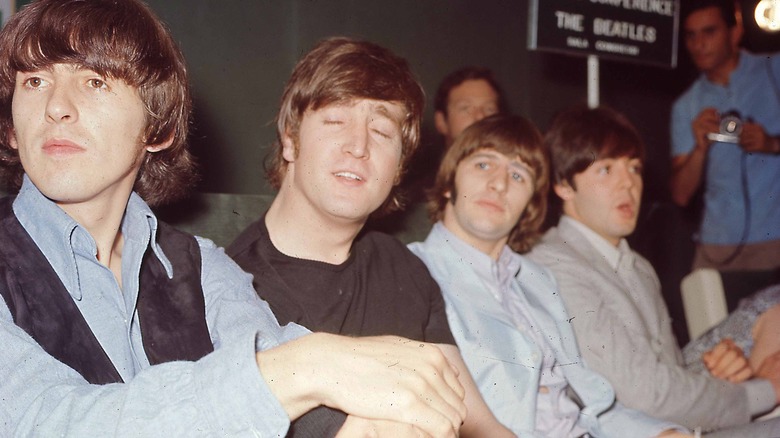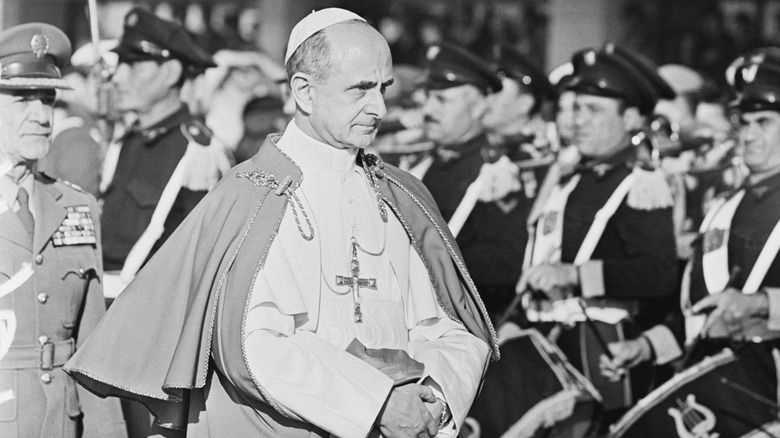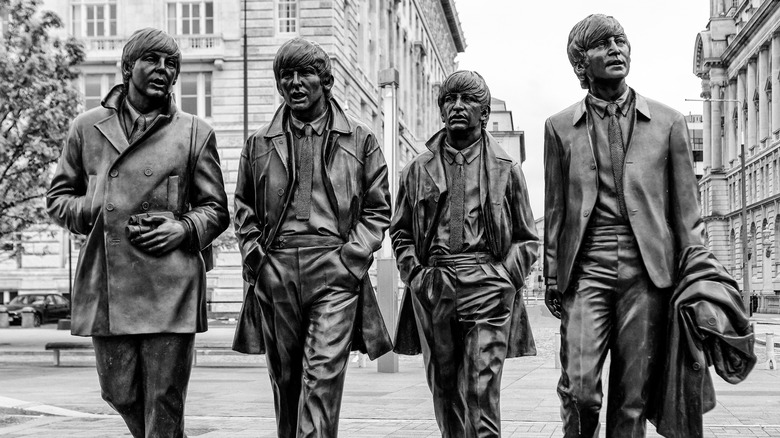The Real Reason The Vatican Hated The Beatles
Religion and rock 'n' roll have often been like oil and water. Ever since the likes of Bill Haley, Little Richard, and of course, Elvis Presley turned this harder-edged form of music into a cultural phenomenon in the 1950s, countless priests, pastors, evangelists, and moral guardians have tried to knock rock. Even with all the proof we've seen that rock musicians aren't the boogeymen they're made out to be, the genre's detractors, religiously affiliated or otherwise, continue warning people about the purported evils of those loud guitars, shouted vocals, and oftentimes profanity-laced lyrics.
This all brings us to the Beatles, who are still rightfully revered for their contributions to rock music and pop culture more than five decades after they disbanded. From the moment they first appeared on "The Ed Sullivan Show" in February 1964, young people gravitated toward them in droves — the boys grew their hair and formed Beatles-inspired garage bands of their own, while the girls screamed their lungs out before, during, and after any given live performance. During interviews, they were candid and cheeky, with a distinctly Liverpudlian sense of humor that reporters mostly loved. However, it was during one of those interviews that the band earned the ire of the religious community — including no less than Vatican City and the pope himself.
Pope Paul VI was not pleased with John Lennon's comments on Jesus
It seemed like a throwaway remark from John Lennon, and these days, it would almost certainly feel that way. But when the Beatles singer-guitarist's interview with the London Evening Standard was published in March 1966, it led to a firestorm of controversy, effectively making the Fab Four Public Enemy No. 1 in many parts of the world. As any Beatles fan should know, Lennon's offending comments had him predicting that Christianity "will go" and that he and his bandmates were "more popular than Jesus now," as quoted by Beatles Bible.
After Lennon's remarks pretty much went viral by 1966 standards, the Beatles were condemned by several religious groups, with one Ohio pastor even warning that he would excommunicate any member of his congregation whom he caught attending one of the Fab Four's concerts (via Rolling Stone). Religious leaders and other individuals held record-burning sessions eagerly attended by people who were similarly upset with one of the world's biggest rock stars insinuating that his group was bigger than Jesus. The Vatican was no exception; in a statement, Pope Paul VI kept it short and not-so-sweet, saying that "some subjects must not be dealt with profanely, even in the world of Beatniks."
Again, it was 1966. It was slightly past the beatniks' heyday, and their spiritual successors, the hippies, were about a year away from becoming a huge cultural presence. While the pope may have sounded a bit clueless, it was as official a condemnation as you can get from the most powerful man in the Roman Catholic Church.
It took 40-plus years for the Vatican to forgive the Fab Four
It may have taken more than four decades, but in 2008, the Vatican made things official once again by forgiving the Beatles for John Lennon's divisive comments about Christianity and Jesus Christ. The occasion was the 40th anniversary of the band's 1968 self-titled double album (aka the "White Album"), and the Vatican published an editorial in its official paper, L'Osservatore Romano, opining that Lennon shouldn't be judged for the quips he made in his youth, especially given his upbringing. "The remark by John Lennon ... sounds only like a 'boast' by a young working-class Englishman faced with unexpected success, after growing up in the legend of Elvis and rock and roll," the Vatican wrote, via The Independent. Interestingly, this came four months after L'Osservatore Romano posted another article that described Elvis Presley as a "nice, sensitive young man."
Two years later, the outlet doubled down on its positive stand on the Beatles, writing that while the band may have lived the rock 'n' roll lifestyle to the fullest and may have also sneaked "Satanic" messages into their tunes, the controversy over Lennon's 1966 interview now seems "distant and meaningless" due to the impact their songs have had. Goldmine chimed in on this second op-ed, pointing out that the group has always been the "last of the Vatican's worries," considering how the Beatles remain popular with believers and non-believers alike and how Lennon transformed into a "messenger of peace when the world needed it."


